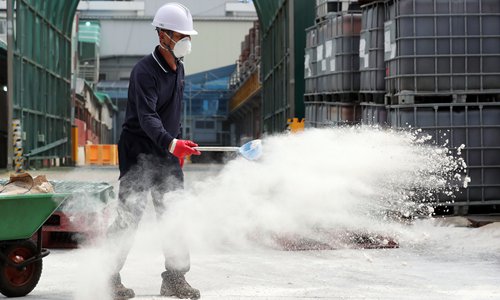HOME >> WORLD
South Korea confirms first African swine fever outbreak
Source:AFP Published: 2019/9/17 18:38:40

A worker in a protective suit disinfects a pig farm on Tuesday in Incheon, South Korea. Photo: VCG
South Korea on Tuesday reported its first cases of African swine fever, becoming the latest country hit by the disease that has killed pigs from China to North Korea, pushing up pork prices worldwide.
Five pigs found dead at a farm in Paju, a city near the inter-Korean border, were confirmed to have been infected with the virus, an official with Seoul's agriculture ministry told AFP. "At this point, it's too early to confirm if the case stemmed from North Korea," the official added.
Seoul's agriculture minister Kim Hyun-soo said 3,950 pigs from three farms in Paju were to be culled.
The country has raised its animal disease alert to the highest level and a nationwide 48-hour ban on the movement of pigs was issued, he added.
The virus is not harmful to humans but causes haemorrhagic fever in pigs that is almost always fatal.
There is no antidote or vaccine and the only known way to prevent the disease from spreading is a mass cull of affected livestock.
Although this was the first confirmed outbreak of African swine fever in South Korea, the country has battled a number of animal diseases in the past.
In 2014, outbreaks of avian flu in poultry farms resulted in the culling of more than 500,000 birds.
A 2011 outbreak of foot-and-mouth disease resulted in the culling of nearly 3.5 million cattle, pigs and other animals.
The confirmed cases in South Korea came around three months after Pyongyang told the World Organization for Animal Health that dozens of pigs had died from the disease at a farm near the Chinese border, according to South Korea's agriculture ministry.
In June, Seoul said the disease was "highly likely" to enter the country from North Korea and ordered fences to be erected at farms along the border to prevent possible contact between pigs and wild boar.
There are around 6,700 pig farms across South Korea and pig farming accounts for 40 percent of the total livestock industry. Last month, the UN's Food and Agricultural Organization said almost 5 million pigs in Asia had died or been culled because of the spread of the disease.
Posted in: ASIA-PACIFIC